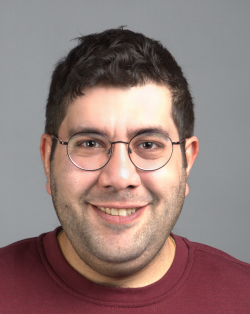Dr. Seyed Soheil Mansouri

Dr. Seyed Soheil Mansouri
Department of Chemical and Biochemical Engineering at the Technical University of Denmark, Denmark
Title: Integration of Computational Chemistry and Process Design for Process Intensification
Abstract: Hydrogen sulfide (H2S) is a major hazardous by-product in oil and gas production as well as many bio-based manufacturing processes, such as anaerobic digestion. Desulfurization of sour gas is essential prior to transportation or further processing due to its extremely toxic, acidic, and corrosive nature. Several offshore oil and gas production platforms are suffering from elevated levels of H2S in recent years, and the production facilities are not designed for such high levels of H2S. Currently, H2S is removed using a non-regenerative scavenging process. The scavenger reacts with H2S and produces less acidic, water-soluble compounds in an irreversible reaction. Although the current process is rather established, it comes with significant challenges. Such challenges include high OPEX due to excessive amounts of the scavenger used in offshore productions, environmental concerns coming from the increasing levels of H2S and increased mass of discharged spent scavenger, and fouling issues creating blockages in several downstream unit operations, such as wastewater treatment facilities.
For these reasons, design and development of more sustainable approaches that can fulfil the H2S content threshold limit requirements and that can eliminate the disadvantages of the current non-regenerative H2S-scavenging process are deemed necessary, specifically from an economic point of view. To tackle this, we propose the use of phase transfer catalysis (PTC), a general methodology applicable to a wide variety of reactions in which inorganic and organic anions, carbenes, and other active species react with organic compounds. The basic principle of PTC is that the reactions take place in heterogeneous biphasic systems (organic-aqueous) with negligible mutual solubility of the phases. This type of two-phase system offers numerous advantages, such as high yields and purity of the products, operational simplicity, mild reaction conditions, suitability for large-scale synthesis, and an environmentally benign nature of the reaction system.
However, the commercialization potential of PTC has been hurt by the lack of availability of accurate thermodynamic parameters, as the chemical domain in the group contribution methods, such as UNIFAC, is inherently limited to the portion of the chemical design space for which every binary interaction parameter is available. Alternatively, COSMO-RS are able to describe liquid-phase thermodynamics without requiring any binary interaction parameters to calculate chemical potentials and, consequently, free energies of solvation. Further, COSMO-RS allows for easy integration of quantum chemical calculations into a process-modeling framework, greatly expanding the envelope of chemical species that can be modeled at a high level of accuracy. In this work, we integrate COSMO-RS methods into Pyomo for process/systems simulations, using Python as a high-level interface, to identify the extent of possible reaction pathways leading to the design of intensified unit operations in an optimization-based integrated product-process design framework.
Finally, with the results of the multi-sale model for process simulation, we conclude with the design and techno-economic analysis of the intensified process, which can be installed on offshore platforms, to simultaneously remove and convert H2S in the method described above and to generate new revenue streams. The added benefits of this new process are that it allows for the efficient recovery of resources by turning the hazardous by-product into an opportunity. The proposed process is therefore well suited for the application of intensification concepts, integrating reaction and separation into a single unit.
Biography
Dr. Seyed Soheil Mansouri is an Assistant Professor in the Department of Chemical and Biochemical Engineering at the Technical University of Denmark (DTU) with a focus on developing systematic methods and tools for synthesis, design, intensification and analysis of sustainable processes. He received his PhD (2016) and MSc (2013) in chemical and biochemical engineering both from DTU and BSc (2011) from University of Kerman. His current research is primarily focused on developing systematic methods and tools for synthesis, design, control/ optimization of chemical and bio-pharmaceutical processes with an aim for more sustainable production and consumption.